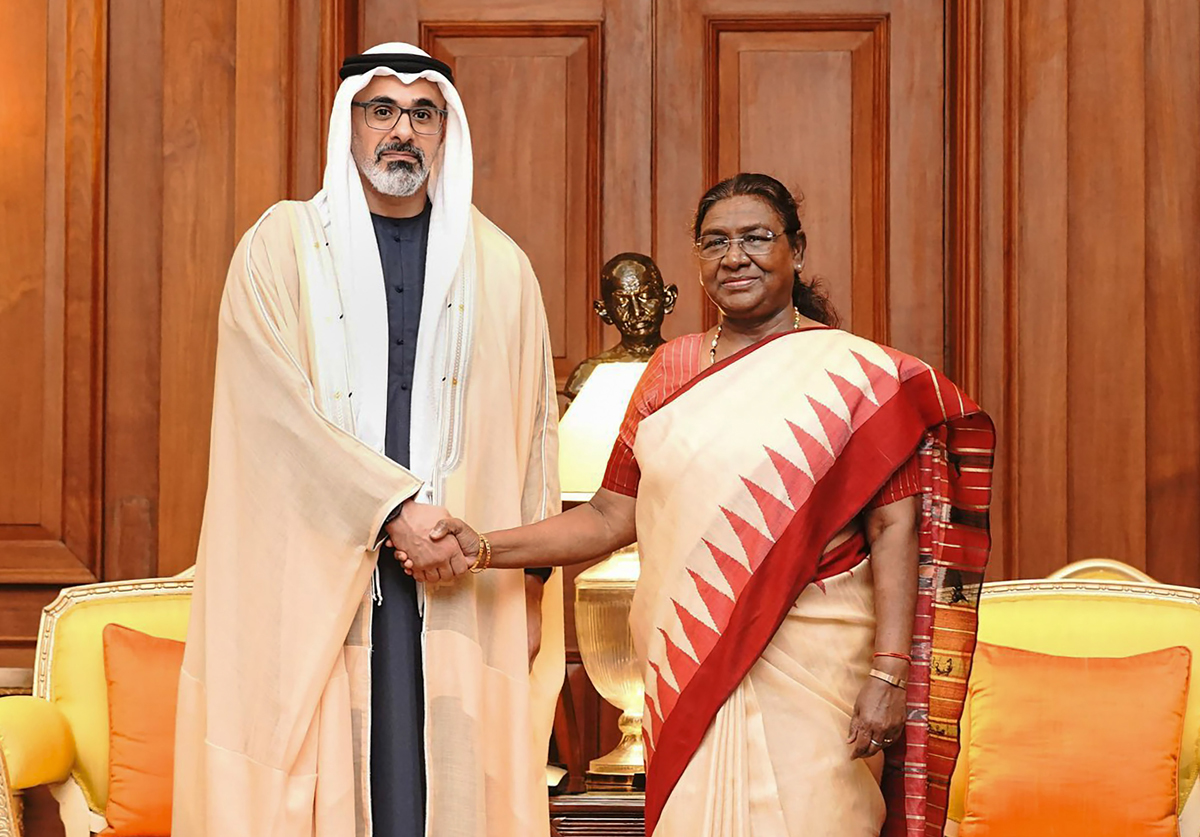Share

NEW DELHI — India and the United Arab Emirates on Monday inked four major pacts that will facilitate crude oil storage, long-term supply of LNG and cooperation in the civil nuclear energy sector as Prime Minister Narendra Modi held wide-ranging talks with Abu Dhabi Crown Prince Sheikh Khaled bin Mohamed bin Zayed Al Nahyan focusing on boosting overall strategic ties.
In their discussions, the two leaders underscored the need to explore new areas of untapped potential, particularly in nuclear energy, critical minerals, green hydrogen, artificial intelligence and cutting-edge technologies, according to the Ministry of External Affairs (MEA).
An agreement for the long-term supply of one million metric tonnes of LNG (liquefied natural gas) per annum to the Indian Oil Corporation Ltd by Abu Dhabi National Oil Company (ADNOC) and another between ADNOC and India Strategic Petroleum Reserve Ltd (ISPRL) are among the four pacts, the MEA said.
Also read: EAM Jaishankar holds bilateral meetings with his counterparts from Gulf countries
Emirates Nuclear Energy Company (ENEC) and Nuclear Power Corporation of India Ltd (NPCIL) also inked a pact that is expected to enhance cooperation in the operation and maintenance of nuclear power plants, the sourcing of nuclear goods and services from India. It will also provide a framework for exploring mutual investment opportunities and capacity building in the civil nuclear domain.
The fourth pact is the production concession agreement for Abu Dhabi onshore block-one between Urja Bharat and ADNOC.
A separate pact was inked between the Gujarat government and the Abu Dhabi Developmental Holding Company PJSC on setting up food parks in India.
The agreement for the long-term supply of LNG for 1 million metric tonnes per annum (MMTPA) is the third such contract signed in just over a year. Both IOCL and GAIL had previously signed long-term agreements for 1.2 MMTPA and 0.5 MMTPA, respectively, with ADNOC.
The MoU between ADNOC and ISPRL provides for exploring ADNOC's participation in additional opportunities for crude storage in India and the renewal of their storage and management agreement on mutually acceptable terms and conditions, the MEA said.
It said this MoU builds on ADNOC's existing involvement in crude storage at the Mangalore Cavern of ISPRL since 2018.
The production concession agreement for Abu Dhabi Onshore Block one between Urja Bharat (a JV of IOCL and Bharat PetroResources Ltd) and ADNOC is the first for any Indian company operating in the UAE.
The concession entitles Urja Bharat to bring crude oil to India, thus contributing towards the country's energy security, the MEA said.
The MoU on food parks conveys ADQ's expression of interest in developing Gundanpara in Bavla in Ahmedabad as a highly promising site for this ambitious project, with a view to commencing the project in the second quarter of 2025.
The Crown Prince, who arrived here on Sunday, will visit Mumbai on Tuesday and participate in an India-UAE business forum.
A soft launch on the commencement of work on the India-UAE virtual trade corridor will take place in Mumbai on Tuesday, the MEA said.
In the talks, Modi and Al Nahyan expressed satisfaction over the "substantial progress" achieved in recent years in the India-UAE Comprehensive Strategic Partnership and discussed opportunities to further deepen the ties in all areas of bilateral cooperation, the MEA said in a statement.
It was a delight to welcome HH Sheikh Khaled bin Mohamed bin Zayed Al Nahyan, Crown Prince of Abu Dhabi. We had fruitful talks on a wide range of issues. His passion towards strong India-UAE friendship is clearly visible. pic.twitter.com/yoLENhjGWd
— Narendra Modi (@narendramodi) September 9, 2024
"They acknowledged that the success of the Comprehensive Economic Partnership Agreement (CEPA) and the recent entry into force of the Bilateral Investment Treaty (BIT) will provide further impetus to the strong economic and commercial partnership between the two countries," it said.
MEA spokesperson Randhir Jaiswal said PM Modi and Crown Prince Al Nahyan discussed the multifaceted relations between India and the UAE with an aim to broaden the comprehensive strategic partnership.
A readout by the UAE side said that the Modi-Al Nahyan meeting also featured discussions on the UAE and India's historical bonds of friendship and cooperation across all key sectors, as well as the two countries' perspectives on several topics of mutual interest.
During the meeting, several strategic agreements were announced within the UAE-India Comprehensive Economic Partnership Agreement (CEPA), it said.
Both countries signed the CEPA in February 2022 and a Local Currency Settlement (LCS) System in July 2023 to promote the use of Indian Rupee and AED (United Arab Emirates Dirham) for cross-border transactions.
After holding talks with Modi, the visiting leader paid tributes to Mahatma Gandhi at his memorial Rajghat.
He became the third-generation leader from the UAE to plant a sapling at Rajghat, following Sheikh Zayed bin Sultan Al Nahyan, former President of the UAE in 1992; and Sheikh Mohamed Bin Zayed Al Nahyan, President of the UAE in 2016.
"This was a unique and rare occasion, showcasing the generational continuity of the strong relationship between the two countries," the MEA said.
"This is the first time in the history of Rajghat that leaders from three generations of a country have planted trees honouring the Mahatma," it said.
In their talks, Modi and Al Nahyan are understood to have also deliberated on pressing global challenges including the situation in Gaza.
The India-UAE ties have witnessed a major upswing in the last few years.
Following the landmark visit of Modi to the UAE in August 2015, bilateral relations between the two countries were elevated to a Comprehensive Strategic Partnership.
About 3.5 million strong and vibrant Indian community forms the largest expatriate group in the UAE.